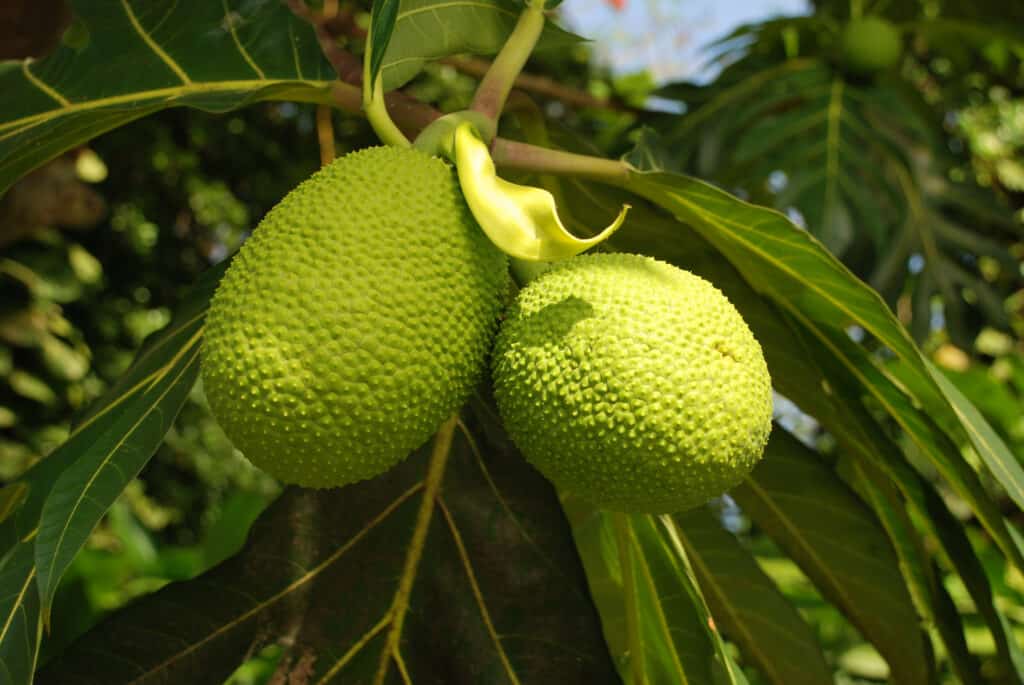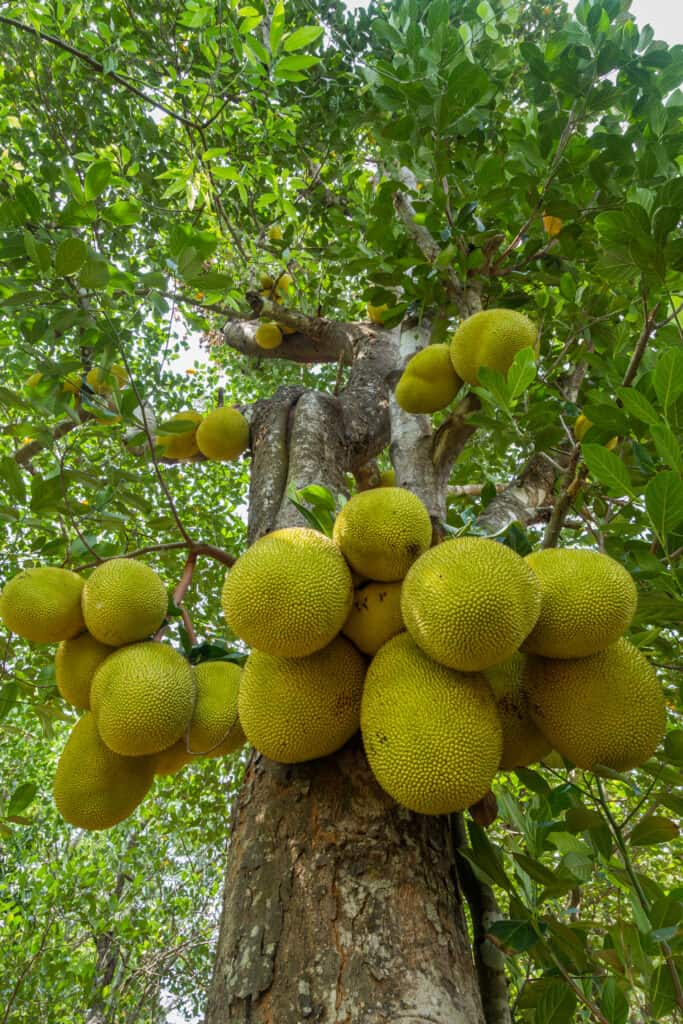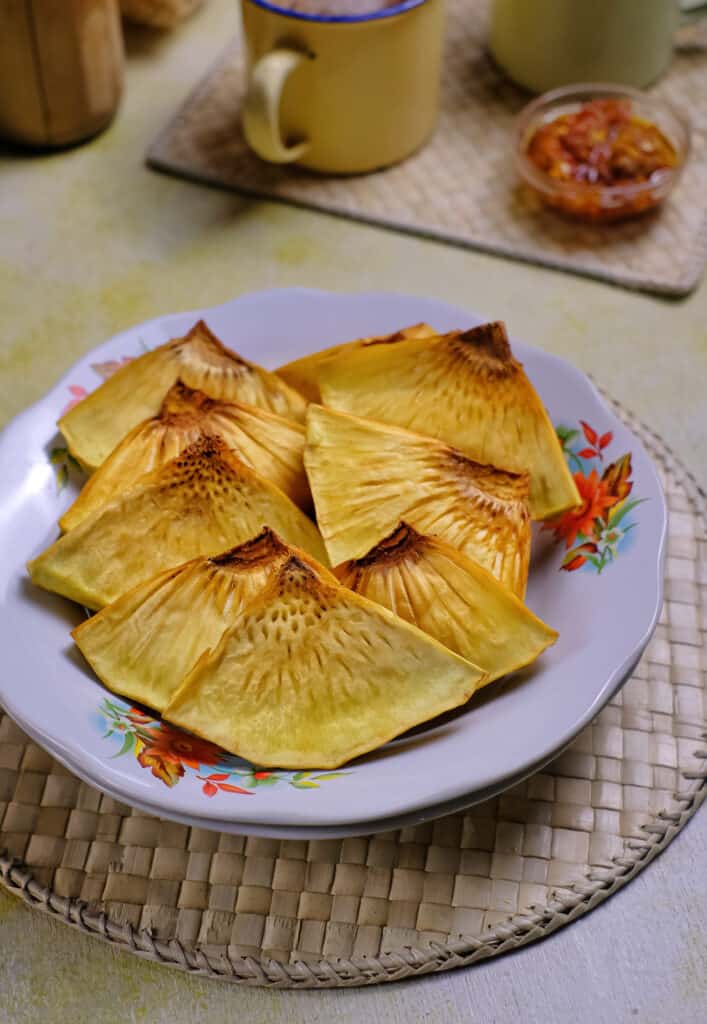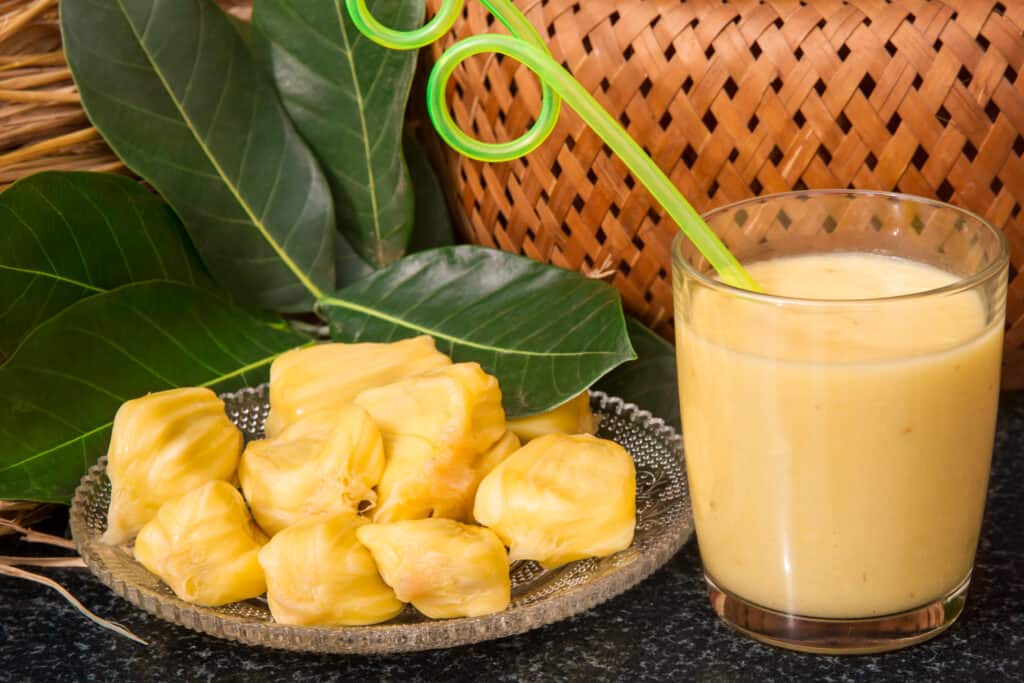Breadfruit and jackfruit are tropical fruits that are dense in healthy carbs. These tropical fruits, which grow on trees, are loaded with nutrients and are used in a vast array of sweet and savory dishes.
Keep reading to learn more about these tropical trees’ plant classifications, characteristics, native ranges, ideal growing conditions, culinary uses, and nutritional facts.
Breadfruit vs.Jackfruit: A Quick Look
Breadfruit vs. Jackfruit: Plant Classification:
Both breadfruit and jackfruit trees belong to the Artocarpus genus of plants. Artocarpus contains about 60 tropical trees and shrubs across Southeast Asia and the Pacific Islands.readfruit and jackfruit also belong to the same family, the mulberry, or Moraceae family.
However, these tropical trees are distinct species. The breadfruit tree’s botanical name is Artocarpus altilis, while the jackfruit tree’s botanical name is Artocarpus heterophyllus.
Breadfruit vs. Jackfruit: Plant Characteristics
Comparing breadfruit to jackfruit, you’ll notice that they share quite a few similar physical characteristics. Both grow to at least 40 feet high and have glossy, dark green leaves with prominent veins, smooth brown trunks, and showy 5-petaled leaves. Altogether, distinguishing these two tropical trees comes down to the notable differences in their leaf shapes and size, and the shapes the fruit they bear.
Breadfruit’s leaves are pinnately lobed, meaning they are deeply cut along the margin almost to the center, with lobes spreading outward along the central axis of the leaf. A breadfruit leaf can contain anywhere from three to 11 of these lobes. Additionally, the leaves of the breadfruit tree can grow up to 3 feet long, making the size of their leaves a notable distinction from the smaller jackfruit leaves.

Astudent82/Shutterstock.com
Jackfruit leaves are elliptical-shaped with a smooth margin. The smaller leaves of the jackfruit can grow 8-12 inches long at maturity and are overall much less eye-catching than breadfruit leaves.
Regarding their fruits, both trees produce an abundance of large, fleshy fruit with similarly bumpy exterior skin. However, the breadfruit tree’s fruit is rounder, whereas the jackfruit tree’s fruit is larger and more oblong. While the fruit of the breadfruit tree typically can reach up to 13 pounds, jackfruits can weigh over 55 pounds, making the jackfruit tree the producer of the world’s heaviest fruit!

v/Shutterstock.com
Breadfruit vs. Jackfruit: Native Ranges
The breadfruit tree is actually a domesticated tree that likely descended from the wild breadnut tree, Artocarpus camansi, also sometimes known as the seeded breadfruit tree, distinguishing it from its seedless descendent. Since the breadnut tree is native to Papua New Guinea, Indonesia, and the Philippines, botanists tend to agree that the domesticated breadfruit’s native range extends from these regions.
The breadfruit tree was spread by traveling Pacific islanders throughout the islands and Southeast Asia.
Similarly, the jackfruit tree is native to the tropical regions of Southeast Asia, and is now widely cultivated in tropical regions around the world.
Breadfruit vs. Jackfruit:Ideal Growing Conditions
Regarding their ideal growing conditions, both trees prefer warm, humid climates, and while neither plant is particularly drought tolerant, the jackfruit tree is sensitive to both drought and overwatering. As such, the jackfruit tree does not tolerate poorly draining soil.
Both trees are tropical plants that will not survive in colder regions. Jackfruit trees will grow in USDA hardiness Zones 10-12, while the breadfruit tree will grow USDA hardiness Zones 9a-11.
Culinary Uses and Nutritional Facts
Breadfruit
In the kitchen, breadfruit is used in similar ways to potatoes and other starchy vegetables. Breadfruit has a slightly sweet, starchy flavor similar to plantain, and when cooked, the taste is often compared to freshly cooked bread. Indeed, breadfruit is a staple ingredient for many people in Southeast Asia and the Pacific Islands and is often used as an ingredient in soups, stews, curries, casseroles, bakes, pancakes, and fritters.

Syanti Ekasari/Shutterstock.com
Breadfruit, like jackfruit, provides a significant source of carbohydrates, fiber, vitamin C, vitamin B1, Vitamin B6, and potassium. Compared to potatoes and white rice, breadfruit actually contains more carbohydrates per serving. A serving of breadfruit provides 22% of the daily recommended amount of carbohydrates, 39% of dietary fiber, 71% of vitamin C, 20% of vitamin B1, 13% of vitamin B6, 23% of potassium.
Jackfruit
Jackfruit, unlike breadfruit, is used as a sweet food or meat substitute, depending on how it’s cooked and which part of the fruit is used. Interestingly, jackfruit has a couple of distinct edible parts with unique flavors that can be used in a variety of culinary dishes. The yellow, fleshy pods that surround the jackfruit seeds are sweet like mango or banana. People often use this part of the jackfruit in sweet dishes such as sweet rice dishes, shaved ice, custards, and cakes. The other edible part of the jackfruit is the white, fibrous flesh that fills in the spaces around the yellow pods. This part of the fruit makes an excellent meat alternative, frequently found in vegan recipes. A widely popular use of the fibrous meat of the jackfruit is in a vegan barbecue pulled pork recipe.

Safronkin Vasilii/Shutterstock.com
Jackfruit, provides a healthy source of vitamin B6, vitamin B1, vitamin C, potassium, and carbohydrates. A serving of jackfruit provides 32% of the daily recommended amount of vitamin B6, 14% of B1, 25% of vitamin C, 16% of potassium, and 14% of total carbohydrates.
Breadfruit and Jackfruit are tropical fruits packed with nutrients that are staples in kitchens across the world.that are used in a variety of dishes from starchy to sweet.
Up Next:
- Cempedak vs Jackfruit: Key Differences
- Durian vs. Jackfruit: What’s the Difference?
- Plantain Tree vs Banana Tree: 5 Key Differences
The post Breadfruit vs. Jackfruit appeared first on AZ Animals.
from Animal News, Facts, Rankings, and More! - AZ Animals https://ift.tt/zMXaH3y